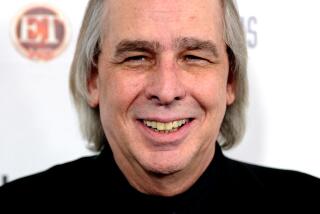WOLFMAN HOWLS AGAIN FROM MEXICO
- Share via
SAN DIEGO — He howled like a wolf. He laughed like a hyena. He screamed out song titles with the brazen hell-be-damned authority of a Marine Corps drill instructor.
His delivery was deemed too bizarre, too outrageous, too histrionic, for American radio.
So in 1962, Robert Weston Smith crossed the border into Mexico and, as Wolfman Jack, began his seven-year reign as the raging lunatic king of Top 40 radio.
His nightly rampages--a blend of popular rock ‘n’ roll, obscure blues and campy verbal antics--were broadcast across much of the United States by two south-of-the-border radio stations whose powerful 250,000-watt signals were aimed directly north.
There was, quite simply, no way of escaping him. As Wolfman Jack himself says, “You could drive from New York to Los Angeles at night and never lose the stations--or the Wolfman. How-wooooo!”
Thursday, the legendary Wolfman returned to Mexican radio for the first time in nearly 20 years. He began a two-day engagement as guest host of the morning (6-10 a.m.) show on local oldies station XTRA-AM (69 XTRA Gold), which broadcasts from Rosarita Beach.
Tune in and you’ll hear something like this: “Hey, San Diego, you got Wolfman Jack and it’s great to be back with all you folks here in San Diego. Yeah! We’re gonna rock ‘n’ roll like you ain’t never rock ‘n’ rolled before. So if you’re ready, the old Wolfman is gonna fumigate your soul. How-wooooo!”
The Wolfman’s appearance is part of the station’s promotion for “Super Hop ‘87,” an oldies concert extravaganza July 29-Aug. 1 in Las Vegas.
Among the more than two dozen rock ‘n’ roll pioneers scheduled to perform are Chuck Berry, Jerry Lee Lewis, Del Shannon, The Diamonds, Fats Domino and Little Anthony. Wolfman Jack, of course, will be the emcee.
“Wolfman Jack is synonymous with personality radio,” said 69 XTRA Gold program director Jim LaMarca. “His distinctive voice, the way he put things together, made him the most famous Top 40 deejay of the 1960s.
“And for awhile there, he was bigger than many of the artists whose records he played.”
He sure was. From his mighty broadcast throne in Mexico, the Wolfman single-handedly influenced the listening habits of hundreds of thousands of American teen-agers. He could make stars and he could break them, simply by deciding whether or not to play their records.
“I was in total control of the two biggest commercial radio stations in the world,” he said, puffing a Mexican chico, or cigarillo, in his San Diego hotel room.
“I probably broke about 300 artists; if it was a good record, I would play it, and before long every other station in the country had picked it up.”
The Wolfman’s on-air persona was, and still is, a hybrid of the early rock ‘n’ roll deejays he idolized while growing up in Brooklyn in the middle 1950s.
“I used to cut school and hang out at a couple of different radio stations,” he said. “I was a real pain . . . until someone gave me a job as a gofer. I did a lot of running around, bringing deejays hamburgers and stuff like that.
“But at the same time, I learned from some of the biggest jocks in the business. One of the deejays I worked with, Alan Freed, would come on the air as ‘Moondog,’ with animal growls and wolf howls and rattling chains. Another animal-type jock was ‘The Hound,’ in Buffalo.
“That’s where the whole ‘Wolfman Jack’ thing came from. I began emulating their styles and, eventually, I developed a style of my own. But when I tried to get on the air myself, no American station would hire me.
“They wouldn’t accept my gig; they didn’t want to take the chance. So I took the chance myself and went on Mexican radio.”
How-wooooo! The rest, as they say, is history. In 1969, Wolfman Jack returned to the United States a full-blown pop hero--part man, part legend.
Wolfman Jack, the man, spent the next seven years as deejay on broadcast giants KDAY-AM in Los Angeles and WNBC-AM in New York. Later, he organized a series of national concert tours; he also hosted television’s “Midnight Special” from 1974 until 1982.
Today, he busies himself writing, hosting and producing several oldies programs, which he syndicates himself to more than 200 radio stations throughout the United States and Canada.
In the meantime, Wolfman Jack, the legend, has been immortalized in such songs as the Guess Who’s 1974 hit, “Clap for the Wolfman,” and the film “American Graffiti.”
“The legend of Wolfman Jack is more than me, more than I ever was,” said the indefatigable Mr. Smith, now 48. “And the man--well, he’s just happy to have survived this long.”
More to Read
The biggest entertainment stories
Get our big stories about Hollywood, film, television, music, arts, culture and more right in your inbox as soon as they publish.
You may occasionally receive promotional content from the Los Angeles Times.









